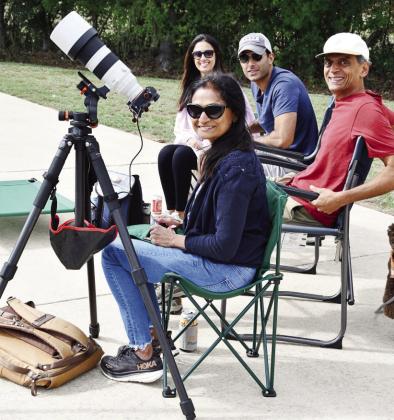The total solar eclipse will grace our skies on Monday, April 8. This is the sky’s most dramatic event.
In the United States, 31.5 million people live within the path of totality. Considering there are 333 million people living in the U.S., that’s approximately 1%. For those people, if the sky is clear, all they need to do is step outside, look up, and BOOM! — eclipse!
In Boerne, the partial eclipse starts at 12:14 p.m. when a small bite out of the sun will indicate what is to come, as the moon is starting to pass between the earth and sun.
Totality begins at 1:32 p.m. and will last until just past 1:36 p.m.
Boerne is in the path of the total solar eclipse. For the lucky residents of Boerne and surrounding areas, we will experience 4 minutes and 32 seconds of darkness. The eclipse ends at 2:55 p.m.
The last total solar eclipse to be visible over any part of what is now Texas came on May 26, 1397 — 626 years ago. You can readily see why this is such an event.
The next total solar eclipse visible from Texas will occur on Aug.12, 2045. The path of totality at that time will enter Texas at the southern tip and exit in the Piney Woods region; The Hill Country will be left out.
If you have a clear sky overhead and somewhat to the south, please stay where you are and appreciate one of nature’s rare events. DO NOT try to drive somewhere and be with your buddies, if you or they must drive to get there. If it’s clear or partially cloudy in Boerne, then Kerrville, Fredericksburg and points in between will be a giant parking lot.
April 8 is a Monday; The crowds will start arriving the weekend before. Hopefully they’ve made their hotel reservations a year in advance.
Again, don’t even think of driving somewhere in Boerne on Monday before or after the event. Stay home, enjoy the show, and cook hamburgers and hot dogs on the grill. Share with your neighbors. Don’t drive to an event; you may not get there.
An hour after totality is over, a good portion of our visitors will pile in their cars and all hit the road, all at the same time. The last U.S. total solar event in 2017 went from west to east in the Midwest.

I had friends who traveled there to catch the rare event, which didn’t have as long of totality as we will get. They booked a room the night before but not the night after.
Big mistake. They were in a rural town smaller than Boerne. The town just wasn’t prepared. It took my friends 8 hours to travel what would have taken 2 hours in normal times to get back to the airport.
Had they just booked the night after the event they would have avoided all of that.
Eyewear and protection — You will need to keep your solar glasses on until the sun is COMPLETELY covered by the moon.
Just before totality a fascinating event occurs, it’s called “the diamond ring effect.” This is the last flash of sunlight just before totality.
When that occurs, you can SAFELY take your glasses off for a few minutes; but make sure you put them back on before totality is over.
I’m going to set a stopwatch on my cell phone for 3.5 minutes, not taking any unnecessary chances.
In Bandera, the total eclipse begins at 1:31:51 p.m. and ends at 1:35:56 p.m., a total of 4 minutes and 5 seconds.
Boerne Star file photo
I’ll be photographing the entire event, so I’ll be watching most of it on my tablet, viewing what the telescope is imaging.
Do take time out not to miss the most important things, which isn’t watching the sun at all.
— There will be a wave of twilight sweeping quickly over the landscape.
— You will notice a temperature drop.
— Unlike evening twilight which only occurs to the west, this twilight will go 360 degrees around your horizon.
— Birds will go to roost, insects will start buzzing like at dusk, domestic and wild animals will lay down, thinking night is coming.
One final note: You will notice this eclipse, whether clear or partly cloudy skies are overhead.







Comment
Comments